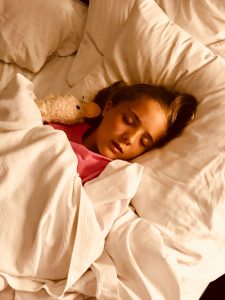 Sleep apnea is a common disorder that causes many pauses in breathing frequently throughout the night. People often believe the condition only affects adults, but children can suffer from sleep apnea, too. Not only is it less common, but it can also be more difficult to diagnose because symptoms can manifest differently than in adults. In fact, sleep apnea can often be misdiagnosed as ADHD in young children. Acting out, restlessness, and throwing tantrums can all be signs of untreated sleep apnea.
Sleep apnea is a common disorder that causes many pauses in breathing frequently throughout the night. People often believe the condition only affects adults, but children can suffer from sleep apnea, too. Not only is it less common, but it can also be more difficult to diagnose because symptoms can manifest differently than in adults. In fact, sleep apnea can often be misdiagnosed as ADHD in young children. Acting out, restlessness, and throwing tantrums can all be signs of untreated sleep apnea.
Sleep Apnea in Children
There are 3 types of sleep apnea, but the most common form is caused by an obstruction in the upper airway. Obstructive sleep apnea occurs when the air passage is narrowed, causing many breathing disruptions while sleeping.
Many factors can contribute to childhood sleep apnea, like large tonsils and adenoids. They partially block the airway, leading to chronic snoring and poor sleep quality. As a result, children can have a difficult time getting up in the morning or struggle to stay awake throughout the day, but those aren’t the only concerns.
ADHD’s Connection to Sleep Apnea
If a child isn’t getting quality sleep, it can affect their mood, language abilities, overall intelligence, and attention span. It can influence their behavior, learning abilities, and mental health.
The diversity of symptoms can make it difficult to determine the underlying cause, which can lead healthcare professionals to believe ADHD is the culprit. Instead, the issues can result from restricted nighttime breathing. Common signs of sleep apnea in children can include:
- Trouble falling asleep
- Trouble staying asleep
- Trouble waking up in the morning
- Waking up in a panic or screaming
- Waking up coughing
- Labored breathing
- Pauses in breathing during sleep
- Strange noises during sleep
- Irritability
- Falling asleep in class
- Difficulty paying attention
- Difficulty retaining information
However, sleep apnea and ADHD can also go hand in hand. 25% to 50% of people with ADHD also have sleep problems, like sleep apnea.
Encourage a Good Night’s Rest
If you or your child’s pediatrician suspects sleep apnea, they’ll schedule a sleep study to monitor their vitals while sleeping. Based on the information, they may refer your little one for treatment if sleep apnea is confirmed.
They’ll likely recommend nonsurgical solutions to manage the symptoms of sleep apnea, depending on the underlying cause. You can help your child get a good night’s rest by:
- Keep caffeinated beverages and foods out of your kitchen.
- Set consistent morning and bedtime routines.
- Limit screen time before going to bed.
- Set the right sleep environment for your child.
- Treat underlying issues, like nasal congestion.
With a few changes at home, your child can sleep peacefully throughout the night to wake up alert and ready to start the day.
About Dr. Pamela West
Dr. West earned her dental degree at the University of Southern California Dental School and has completed advanced education in sleep apnea therapy. She is a member of many professional organizations, including the American Academy of Sleep Medicine. If your child needs sleep apnea treatment, contact our office through our website or call (702) 602-4000 to schedule an appointment.
